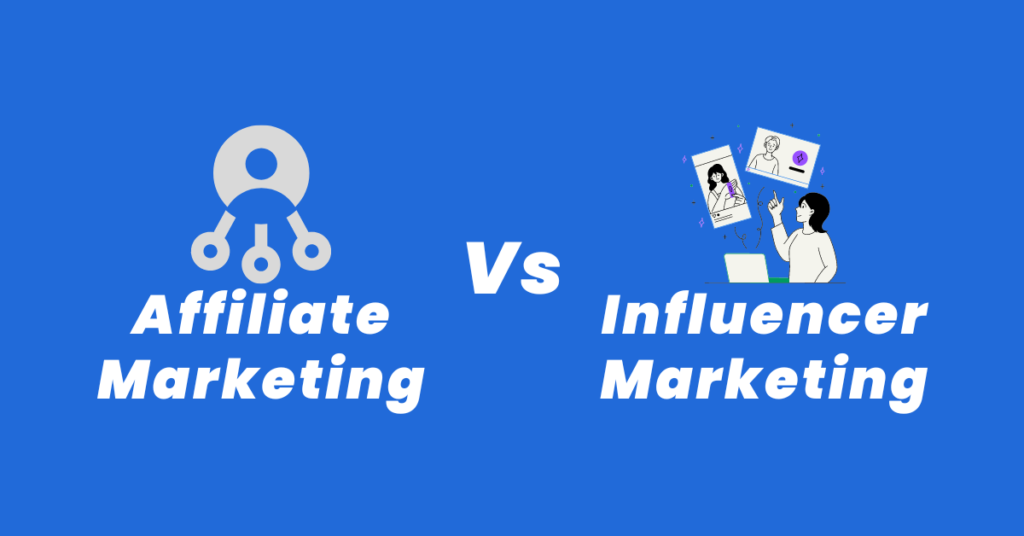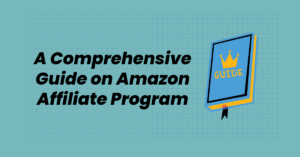Affiliate Marketing vs Influencer Marketing: Which is Better?
Affiliate marketing vs influencer marketing are two popular strategies in the realm of digital marketing. Both approaches have their unique advantages and can be effective in promoting products or services. However, understanding the differences between these two methods can help businesses determine which one aligns better with their goals and resources.

How Affiliate Marketing Works
Affiliate marketing revolves around the concept of partnerships. Companies create affiliate programs that allow individuals or businesses (affiliates) to promote their products or services in exchange for a commission.
Affiliates earn a commission when they successfully refer customers or generate sales through their promotional efforts.
To track these referrals, unique affiliate links are used, ensuring proper attribution and commission calculations.
Benefits of Affiliate Marketing
Affiliate marketing offers a significant advantage in terms of cost-effectiveness. Businesses only pay commissions when desired actions, such as a sale or lead generation, occur. This performance-based model allows for better budget control and minimizes the risk of ineffective marketing campaigns.
Additionally, affiliate marketing offers a wide reach and scalability since affiliates can promote products across various channels, including websites, blogs, and social media.
Drawbacks of Affiliate Marketing
While affiliate marketing presents several benefits, it also has its drawbacks. Businesses have limited control over how affiliates promote their products, which can impact brand perception.
Furthermore, affiliate marketing success relies heavily on affiliates’ performance, making it essential to choose reliable and competent partners.
Additionally, the industry faces challenges such as potential fraud and unethical practices by some affiliates, requiring continuous monitoring and enforcement of policies.
How Influencer Marketing Works
Influencer marketing leverages the popularity and reach of social media influencers to promote products or services.
Companies collaborate with influencers who have a substantial following and engage with their target audience.
Influencers create sponsored content or endorse products, showcasing them to their followers through various social media platforms.
This type of marketing aims to build brand awareness, credibility, and trust among the influencer’s audience.
Benefits of Influencer Marketing
One significant advantage of influencer marketing is the ability to engage with a targeted audience.
Influencers have built a loyal following that shares common interests, allowing businesses to reach potential customers who align with their brand values.
Influencers also bring authenticity to promotional campaigns, as their audience trusts their opinions and recommendations. Moreover, influencer marketing facilitates content creation and storytelling, enabling brands to craft compelling narratives around their products or services.
Drawbacks of Influencer Marketing
Influencer marketing, despite its benefits, has some drawbacks. Collaborating with influencers can be costly, especially when partnering with highly popular personalities.
Businesses must carefully consider their budget and expected return on investment when selecting influencers. Another challenge is the potential lack of control over the message conveyed by influencers. While guidelines can be provided, influencers have their unique style and voice, which may slightly deviate from the brand’s intended message.
Additionally, the risk of influencer controversies or reputation issues can negatively impact a brand’s image.
Affiliate Marketing vs Influencer Marketing
Rather than viewing affiliate marketing and influencer marketing as mutually exclusive, businesses can harness the synergy between these two strategies. By combining both approaches, companies can expand their reach and tap into different audience segments.
Affiliate marketing can provide a wider reach across various platforms, while influencer marketing can create a more personalized and authentic connection with specific target audiences.
It’s crucial to consider the budget, goals, and target market when deciding which strategy to prioritize.
FAQs
Are affiliate marketing and influencer marketing mutually exclusive?
No, both strategies can complement each other. Combining affiliate marketing and influencer marketing can expand reach and target different audience segments effectively.
Is affiliate marketing more cost-effective than influencer marketing?
Affiliate marketing is often considered more cost-effective since businesses pay commissions only when desired actions occur. Influencer marketing can be more expensive due to the fees associated with collaborating with popular influencers.
Can businesses control how affiliates or influencers promote their products?
While businesses can provide guidelines, they have limited control over affiliates and influencers’ promotional activities. Monitoring and selecting reliable partners are crucial for maintaining brand integrity.
How does influencer marketing contribute to brand credibility?
Influencer marketing helps build brand credibility by leveraging the trust and authenticity influencers have established with their audience. Recommendations and endorsements from influencers can positively influence consumer perception.
Should businesses prioritize one strategy over the other?
The choice between affiliate marketing and influencer marketing depends on the specific goals, target audience, and available resources of the business. Companies can also consider utilizing both strategies to maximize their marketing impact.
Conclusion
Affiliate marketing and influencer marketing offer distinct advantages and can be effective in promoting products or services.
Affiliate marketing provides a cost-effective and scalable approach, while influencer marketing enables targeted engagement and authenticity.
Businesses should evaluate their objectives, available resources, and target audience to determine the most suitable strategy or a combination thereof.
By leveraging the strengths of both approaches, companies can optimize their marketing efforts and achieve their desired outcomes.
Read More







